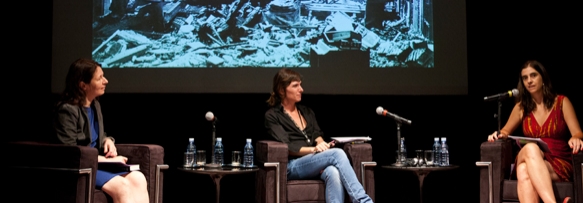Dominique commented
The author of a body of work regarded as complex for the general public, Dominique Gonzalez-Foerster is featured in Literatura Expandida, a book recently released by Videobrasil and Edições Sesc-Sp that makes key aspects of her work easily comprehensible. The book is based on Ana Pato’s master’s research, conducted with guidance from Lisette Lagnado, and it has also created the opportunity for a meeting between the artist, curator Daniela Castro and Ana Pato on March 7. The meeting opened with a viewing of one of Foerster’s video works and closed with an address from herself about her production. She discussed issues such as her manipulation of references, archives and quotes, her relationship with various ways of showing her work, and the constant presence of her intimate universe in her work.
Daniela Castro kicked off the meeting by saying that the affective dimension arising from her contact with Dominique Gonzalez-Foerster’s work after reading the book led her to embark on a personal quest for a significant archive that would provide a theme on which to comment. She then created an allegorical operation that invoked references to how narrative construction can take on different structures: be it the circular character of the One thousand and one nights, in which Scheherazade guides the sultan through interconnected stories and thus escapes execution, or the multiple narrative forms in Osman Lins’ Avalovara, in which a linguistic challenge triggers a personal quest for one’s own freedom. The many configurations acquired by narratives can put in check the categorical oppositions between notions such as life and death, beginning and ending, freedom and confinement.
In both examples cited by the curator there seems to be a metonymical action in place, an operation which replaces significant elements in order to produce new meanings. This seems to also be the case in the work of the French artist and in Ana Pato’s research, both of whom articulate quotes that are internally important and interrelated. Castro also quotes Simone de Beauvoir, whose For a philosophy of ambiguity claims that death is intelligible, while life is but the attribution of meaning to existence. Dominique’s art presumably has a similar capacity to build discourses and propositions from a matter which we know only from the perspective of its final destination, which is akin to death: the archive.
Next, in keeping with her research, Ana Pato set forth an authorial commentary titled A trap for the spectators of narratives by means of references and quotes both veiled and explicit. Based on an anonymous photograph from the English Heritage collection (above) upon which she built a piece of fiction, the writer revealed that she became acquainted with Dominique’s work by means of a process of discovery and personal fascination that involved research, reflection and invention. As she put it: “with so many things to borrow, I feel glad if I can steal something, change it around, and disguise it to a new purpose. The new poet no longer recognizes himself as the “author,” but rather as one who is able to select, to switch and to corrupt the humongous library that the world has turned into. And the form of reading that this new poetry suggests is not the same either. In order to read, one must assemble the pieces of a puzzle.”
In contrast with a context that is about pinning down true and false pieces of information, while examining and emulating the work of Gonzalez-Foerster in an essayistic register “that distinction [between true or false] loses meaning, as we come to regard forms no longer as discoveries (aletheiai) or fiction, but rather as templates. In the past it made sense to differentiate science and art, but today it seems senseless. Dominique articulates her experimentation involving literary text and aligning herself with the methods and thoughts of contemporary authors whom, faced with the impossibilities of a world where all has been written, exhort a culture of quotes.”
View footage of the event above.
